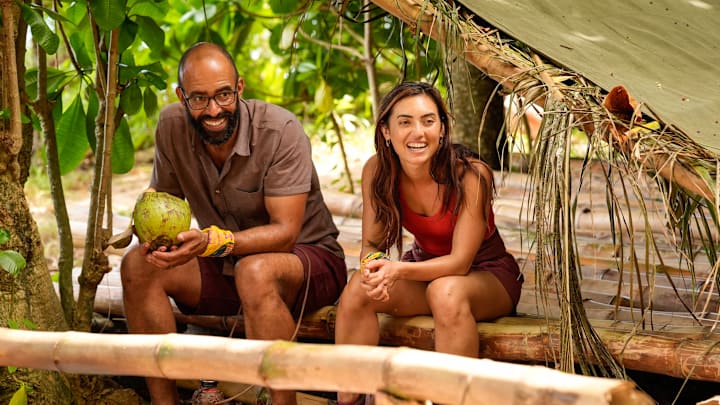We got a unique insight into Survivor's game design in Survivor 49 episode 4, "Go Kick Rocks, Bro." As the 14 remaining castaways took to their tribe mats at the beginning of Survivor's latest episode, Jeff Probst informed the castaways about how the production team structures the twists and turns they throw in any given season.
Probst went on to tell the cast that in pre-production, producers had planned on swapping tribes when there were fourteen remaining players in the game. And while Jake's medical evacuation the previous episode had brought the cast down to fourteen earlier than scheduled, the Survivor team decided to proceed with their planned tribe swap, only seven days into the game.
I've always been a fan of tribe swaps. They provide just the right amount of chaos for a cast that has typically started to establish the pecking order of their starting tribes one third of the way into the game. It also gives us as a TV audience the chance to see our favorite players interact with each other and create new bonds that could last through the end of the game.
But a tribe swap only works as intended when players have had the time to establish true friendships and/or animosity towards each other on their starting tribes. Only being seven days in, these tribes still only know each other on the most surface level. Heck, it takes me a week or so to consistently remember people's names, let alone their place within a group dynamic.
If you swap too early, you risk the players uniting behind the only thing that bonds any of them at this stage, and that's the color of their starting buff.

We saw the negative effects of swapping too early in Survivor: Ghost Island when a day 7 swap gave way to the agonizing "Naviti strong" catchphrase, which lead to the decimation of the opposing Mololo tribe, and created a path for the Dom/Wendell steam roll of the entire post-merge. A similar pattern has possibly emerged in Survivor 49, where the supermajority Hina and Uli alliances have adopted Sophi Balerdi and Alex Moore into their ranks in what will otherwise be a red/yellow bloodbath.
In particular, we saw this negative path in action when the Uli alliance of Nate Moore, Savannah Louie, Rizo Velovic, and Jawan Pitts stick to their red tribe origins without much of any resistance as they picked between Matt Williams and Jason Treul to send home. And the pecking order from old Uli remains almost exactly the same despite the tribe swap.
In almost any other season, someone in say Jawan's postion would've had more time to process that he's at the bottom of this Uli four. The Nate, Savannah, Rizo trio clearly see him as disposable as evidenced by Savannah's confessional admitting so. If this was Day 14 rather than Day 8, perhaps Jawan would see Matt's proposal to blindside Nate as less of a crackpot plan of desperation and more as a legitimate option to flip the power structure of the game. But with so little time to make these reads and think about his place in the power structure, Jawan stuck with the overwhelming numbers, and did so in spite of what might actually be his best interest in the long-game.
That's actually tapping into a larger issue with the "new era" format. In a shortened 26-day game, the more chaos induced by production, the more conservative the cast plays. More and more often, it feels like those at the bottom of a large alliance see sticking with the numbers as their optimal move.
In a 39-day game, castaways had more time to develop strong emotions towards their tribemates. There was more time for paranoia to set in about being socially outcast, more time for castaways to tick each other off, to the point where once a swap or merge came the opportunities for disgruntled players to jump ship were much more abundant.
The current format favors the cool-headed social players who know to eliminate players who cause chaos and keep their initial bonds loyal to them, which while impressive to watch, can lead to a meandering and predictable TV product.
Whether its players like the Nate, Savannah, Rizo trio on new Hina or a player like Steven on new Kele, it feels like the rich got richer this tribe swap. Will "Uli Strong" or "Hina Strong" be the rallying cry of Survivor 49? We'll find out, but it sure seems like that so far!
